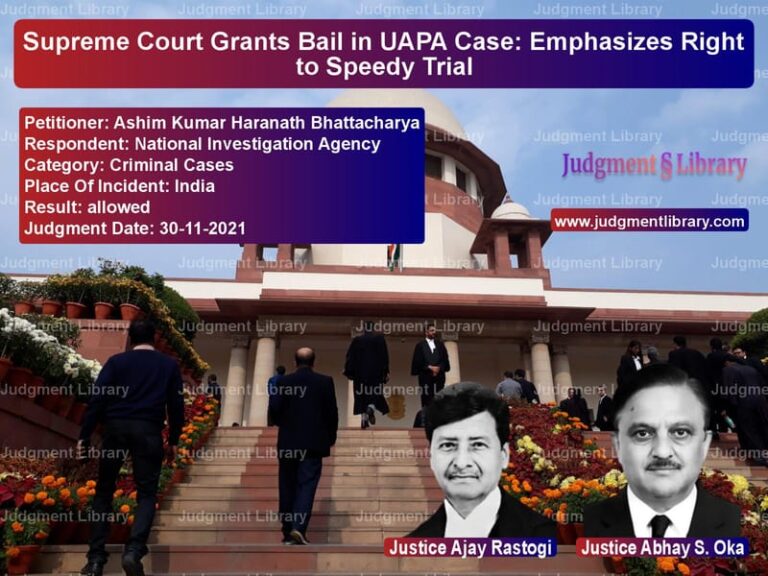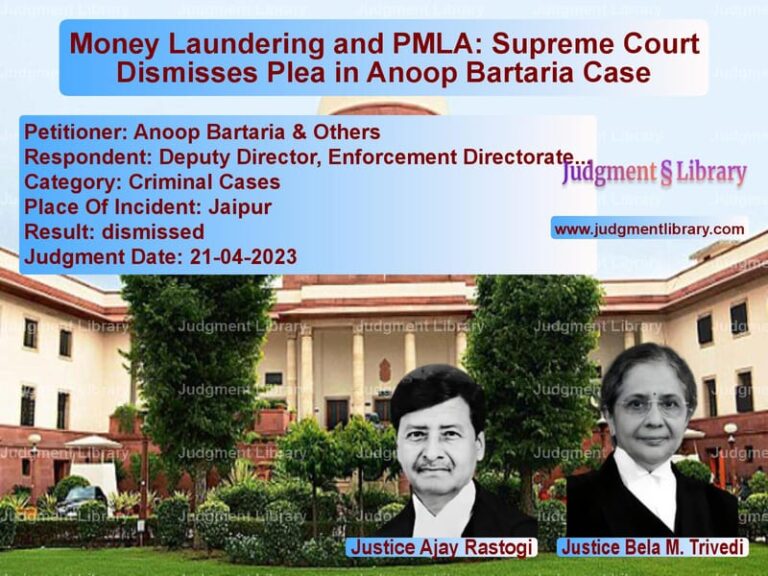SARFAESI Act and Mortgage Redemption: Supreme Court Ruling on Auction Finality
The Supreme Court of India recently delivered a landmark judgment in the case of CELIR LLP vs. Bafna Motors (Mumbai) Pvt. Ltd. & Ors. The case primarily revolved around the interpretation of the Securitization and Reconstruction of Financial Assets and Enforcement of Security Interest Act, 2002 (SARFAESI Act), specifically regarding the right to redeem a mortgage and the finality of auction proceedings. The judgment reinforces the principle that borrowers cannot reclaim mortgaged property after an auction notice is published under the SARFAESI Act. This ruling strengthens the legal framework surrounding secured transactions, providing clarity on borrower and auction purchaser rights.
One of the key aspects examined by the Court was whether the borrower, after the completion of an auction sale, could still exercise their right of redemption. The case also addressed the role of banks in ensuring transparency and legal adherence in auction sales under the SARFAESI Act. By ruling in favor of the auction purchaser, the Supreme Court upheld the sanctity of auction processes, discouraging last-minute disruptions by borrowers attempting to reclaim mortgaged properties.
Background of the Case
The dispute arose when Bafna Motors defaulted on a substantial loan of approximately ₹100 crore borrowed from Union Bank of India. Due to the failure of the borrower to repay the loan, the bank initiated proceedings under the SARFAESI Act to recover the outstanding amount. The secured asset in question—a large parcel of industrial land located in Navi Mumbai—was repeatedly put up for auction, but the bank struggled to find suitable bidders.
Finally, in June 2023, an auction took place where CELIR LLP emerged as the highest bidder, offering ₹105.05 crore for the property. The sale was confirmed, and CELIR LLP made the required payments to the bank. However, after the auction was completed, Bafna Motors moved the Bombay High Court, claiming that it still had the right to redeem the mortgage. The borrower offered ₹129 crore to settle the outstanding dues and requested that the auction be set aside in favor of allowing redemption.
The High Court ruled in favor of Bafna Motors, directing the bank to accept the borrower’s payment and return the deposit made by the auction purchaser, CELIR LLP. This decision led CELIR LLP to challenge the order before the Supreme Court.
Key Legal Questions Before the Supreme Court
- Does the borrower retain the right of redemption after the auction notice has been published under the SARFAESI Act?
- Was the Bombay High Court correct in allowing the borrower to redeem the mortgage even after the auction was concluded?
- What is the scope of Section 13(8) of the SARFAESI Act concerning the right to redemption?
- Does the Transfer of Property Act, 1882, apply once SARFAESI proceedings have commenced?
- What are the legal protections for auction purchasers when auctions are set aside?
Petitioners’ Arguments (CELIR LLP)
CELIR LLP, represented by senior counsels, put forth the following arguments before the Supreme Court:
- The borrower’s right of redemption under Section 60 of the Transfer of Property Act, 1882 was overridden by the SARFAESI Act, particularly after the 2016 amendment to Section 13(8).
- Once the auction notice was published and the sale was completed, the borrower no longer had any statutory right to redeem the mortgage.
- The High Court erred in allowing the borrower to redeem the property after the conclusion of the auction sale.
- The SARFAESI Act provides a specific mechanism for debt recovery, and judicial interference at the execution stage disrupts the legal process.
- The reversal of the auction sale would discourage potential buyers from participating in future auctions, thereby affecting the effectiveness of the SARFAESI Act.
Respondents’ Arguments (Bafna Motors)
The borrower, Bafna Motors, represented by its legal counsel, countered the petitioner’s claims with the following arguments:
- Their right of redemption was a fundamental right under Section 60 of the Transfer of Property Act, 1882.
- Despite SARFAESI proceedings, equitable principles dictated that the borrower should be allowed to redeem the mortgage if they could settle the entire outstanding amount.
- Their offer of ₹129 crore was significantly higher than the auction price of ₹105.05 crore, which was in the best interest of the bank and the creditors.
- The bank had a fiduciary duty to maximize recovery and act in good faith, rather than simply adhering to auction procedures.
Key Findings of the Supreme Court
The Supreme Court ruled in favor of CELIR LLP, stating that:
- Extinguishment of Redemption Rights: Section 13(8) of the SARFAESI Act, as amended in 2016, clearly states that once the auction notice is published, the right to redeem is extinguished. This provision overrides the general right under the Transfer of Property Act.
- Finality of Auctions: The Court emphasized that once an auction has been lawfully conducted, borrowers cannot interfere post-sale.
- Legal Certainty for Auction Purchasers: Reversing an auction sale at the borrower’s request would create uncertainty and discourage future participation in SARFAESI auctions.
- High Court’s Error: The Bombay High Court erred in entertaining a writ petition when an alternative remedy was available under the SARFAESI Act.
- Role of Banks: The bank was bound to issue a sale certificate to the highest bidder upon completion of payment, without allowing redemption attempts post-sale.
Verbatim Observations of the Court
“The right to redemption under the SARFAESI Act must be exercised before the auction notice is published. Allowing redemption post-auction would defeat the entire purpose of the SARFAESI mechanism.”
“Judicial intervention in completed auction processes must be exercised with caution to maintain the confidence of investors and bidders.”
Legal Precedents Relied Upon
The Court referred to previous rulings, including:
- Mathew Varghese vs. M. Amritha Kumar (2014) 5 SCC 610 – Established that redemption is permissible only before the sale is finalized.
- Shakeena vs. Bank of India (2019) 10 SCC 607 – Affirmed the extinguishment of redemption rights under SARFAESI once the auction notice is issued.
Implications of the Judgment
This ruling has significant legal and commercial implications:
- Borrowers cannot interfere with mortgage auctions once an auction notice is published.
- Ensures predictability and confidence in SARFAESI auctions.
- Protects the rights of auction purchasers from last-minute challenges.
- Limits judicial intervention in completed sales.
Conclusion
The Supreme Court’s decision in this case reinforces the sanctity of auction sales under the SARFAESI Act and prevents borrowers from disrupting auctions post-sale. By ruling in favor of CELIR LLP, the Court has upheld the principle that redemption rights under mortgage law cease once the auction process is initiated under the SARFAESI framework. This landmark judgment provides much-needed clarity and legal certainty for banks, auction purchasers, and financial institutions involved in secured debt recovery.
Petitioner Name: CELIR LLP.Respondent Name: Bafna Motors (Mumbai) Pvt. Ltd. & Ors..Judgment By: Justice Dhananjaya Y. Chandrachud, Justice J.B. Pardiwala.Place Of Incident: Mumbai, Maharashtra.Judgment Date: 21-09-2023.
Don’t miss out on the full details! Download the complete judgment in PDF format below and gain valuable insights instantly!
Download Judgment: celir-llp-vs-bafna-motors-(mumbai-supreme-court-of-india-judgment-dated-21-09-2023.pdf
Directly Download Judgment: Directly download this Judgment
See all petitions in Bankruptcy and Insolvency
See all petitions in Corporate Compliance
See all petitions in unfair trade practices
See all petitions in Judgment by Dhananjaya Y Chandrachud
See all petitions in Judgment by J.B. Pardiwala
See all petitions in allowed
See all petitions in Quashed
See all petitions in supreme court of India judgments September 2023
See all petitions in 2023 judgments
See all posts in Corporate and Commercial Cases Category
See all allowed petitions in Corporate and Commercial Cases Category
See all Dismissed petitions in Corporate and Commercial Cases Category
See all partially allowed petitions in Corporate and Commercial Cases Category







